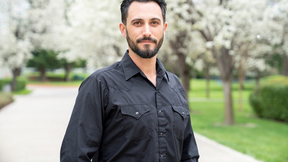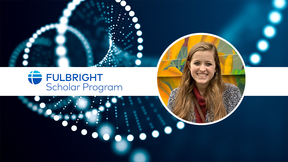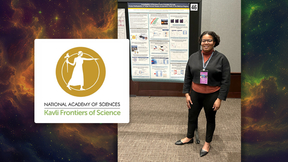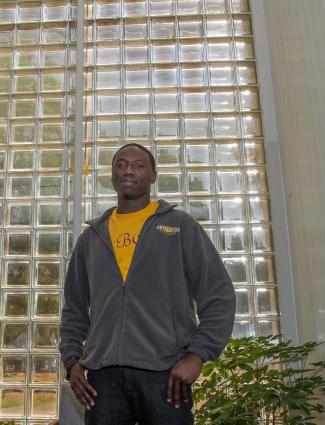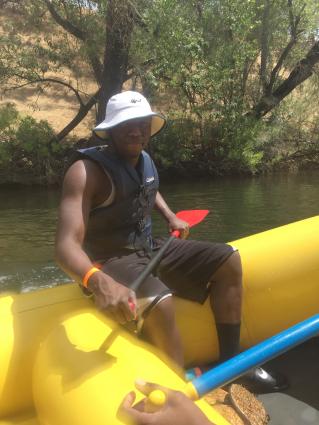Meet Dayjon Gabbidon: future health physicist
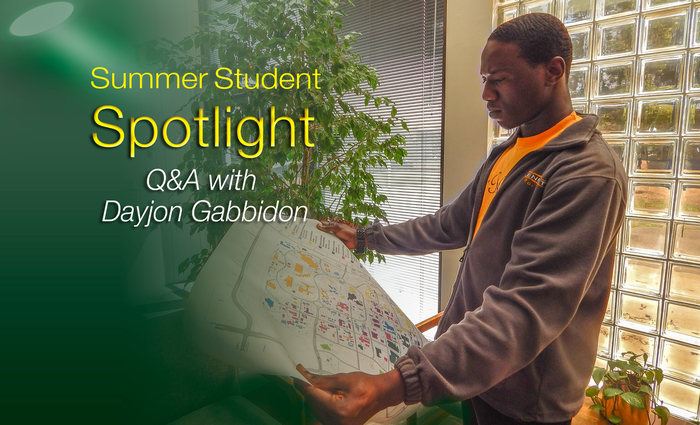 (Download Image)
Dayjon Gabiddon recently graduated with a bachelor’s degree in biology from Benedict College in Columbia, South Carolina. He aspires to work at the Laboratory as a health and safety technician while pursuing a master’s so that he can eventually become a health physicist. Photo by Julie Russell/LLNL
(Download Image)
Dayjon Gabiddon recently graduated with a bachelor’s degree in biology from Benedict College in Columbia, South Carolina. He aspires to work at the Laboratory as a health and safety technician while pursuing a master’s so that he can eventually become a health physicist. Photo by Julie Russell/LLNL
Editor's Note: This is one in a series of articles highlighting the diverse group of Lawrence Livermore National Laboratory summer students.
______________
The Lawrence Livermore National Laboratory (LLNL) student internship program is designed to allow students to engage in work-study employment opportunities in relevant science, technology, engineering, mathematics (STEM) and administrative fields during the summer academic break. This year, LLNL is proud to welcome more than 600 students from universities nationwide and around the world.
Introducing: Dayjon Gabbidon
Full name: Dayjon D. Gabbidon
Hometown: Charleston, South Carolina
University attending/educational background: Recently graduated from Benedict College in Columbia, South Carolina, with a bachelor’s degree in biology.
Major: Biology
Graduation year: 2015
LLNL Directorate you are working in: I am working in the Facilities and Infrastructure Department within the Operations and Business Directorate.
What interested you in pursuing a summer internship at the Laboratory?
I would have never heard about the Lab if it wasn’t for the persistence of Tony Baylis (director of diversity programs at the Lab). I have a broad interest in radiation and Tony helped me by introducing me to the Laboratory, exposing me to additional potential career paths within the radiation field. I find it very motivating that students who are currently pursuing their education have the chance to come to a national laboratory and experience the programs available firsthand.
What are you working on at the Laboratory?
I am working on LLNL’s legacy facilities stewardship program. My responsibilities were to develop and document a process to quantify and qualify historical and current documents and data into characterization data sets for the stewardship and final demolition of key process contaminated legacy facilities. In short, I’d collect the proper information for facilities that are commissioned for demolition. To simply demo a building isn’t that easy, it must be characterized in the likes of hazards and waste levels.
What do you enjoy most about interning at the Laboratory?
The one thing I enjoy most at LLNL is that the opportunities aren’t vague. There are many things you can do or be a part of and gain valuable experience in. In addition, I enjoy meeting other interns here that are from places I have never been. To be able to share and communicate with them is a bonus because you can learn new adventurous things about them and where they come from.
What have you learned (or are learning) that has made a difference to you?
Being here has shown me the importance of building characterization of facilities. I believe the Institutionally Managed Facilities (IMF) Program is, and should be, well appreciated for their work ensuring the safety and accessibility of facilities for all employees. My mentor, Darlene Yazzie, despite being new to the group herself, has been sharing with me all the different aspects of the field. Understanding waste and contamination situations pinpoints the importance of handling these scenarios in the proper manner.
Where do you see yourself after graduation? What is your dream job?
Having just graduated in May with my bachelor’s degree, coming to the Laboratory has been an invaluable opportunity to learn about different careers, many of which I had never heard of before. Through my undergrad pathway I was always more focused on the medical side of radiation and in becoming a radiologist. Interning here has opened my eyes toward the safety and environmental side of radiation. Because of my interactions with LLNL health physics professionals, Phil Worley and Kathy Shingleton, I am now leaning toward a career as a health physicist. It is exciting to speak to a professional and have in mind that I might one day be sitting in their position. Overall, I want to continue to learn about new things that are offered here, keep my options open and find what fits best for me.
Who/what has inspired you to pursue an education and career in a STEM field?
The idea of being in a STEM field had to come from my mother, who previously was a nursing assistant. I remember she would tell me stories how she was able to assist the elderly with daily tasks they needed help with. From there on, I knew I wanted to help individuals in some way.
What has been your biggest challenge to overcome?
The biggest challenge to overcome thus far was getting through my undergrad. I am sure many can relate when I say that there are a lot of things that go on during your undergrad years, especially in this generation. Meeting new people, joining organizations, sporting events, fraternities/sororities, parties, etc. are a big part of college life. Although these things are fun, they can be a distraction sometimes in the pursuit of your education. Everyone is likely to at least experience seeing these events in action, which isn’t a horrible thing; my only concern is having the discipline to spend your time wisely and remember that you are pursuing a degree, which is most important.
What do you consider to be your biggest accomplishment so far?
As of right now, obtaining my bachelor’s degree has been my biggest accomplishment. I am hopeful that down the road I will obtain a master’s degree or Ph.D. and then say that is my biggest accomplishment. I want to pursue my goal, put the work in and feel deserving to be in my ideal position that I worked hard for so that I can share my success with my family.
As a college student, what is the most important lesson you have learned?
Time management is one of the key factors I learned that was important as a college student. Time isn’t waiting for anyone, so it is best to use it before it runs out. I firmly believe in preparing for the worst rather than not being prepared at all. With time used wisely, that is achievable.
What advice would you give a high school student?
The best advice I can give to a high school student is to take advantage of the opportunities presented while pursuing your education. There are chances that only happen once in a lifetime and I wish I could go back myself and look more into those opportunities, instead of ignoring them. I am the oldest of five siblings and I continue to tell them the same thing to ensure they use their given potential to the fullest. One more thing I might add is trying not to stress too much as a young adult and enjoy the time you have while you are free from the responsibilities of adulthood.
What do you like to do in your spare time? What are your hobbies?
I enjoy spending time with my family and friends, reading, playing video games and exercising.
What is next for you/what are you looking forward to?
LLNL’s summer intern program has really given me the chance to look deeply into my future options. I would love to someday be part of the full-time staff and continue to help improve the agenda of the Lab and also aid in giving students like me the opportunity to come out here and show that they can make a difference. I am currently looking into a health and safety technician position here at the Lab as my time as an intern is coming to an end. With continuing support, I want to focus on getting my master’s degree so that I can become a health physicist here at LLNL.
_________________
To learn more about summer internships and the Laboratory’s scholar programs, visit the scholars@llnl website.
Follow inside LLNL on Twitter for an inside look at the people and events at LLNL.
Contact
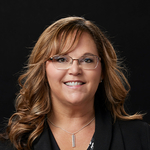 Carrie L Martin
Carrie L Martin
[email protected]
(925) 424-4715
Related Links
Benedict CollegeLLNL student internship programs
Inside LLNL on Twitter
Tags
Academic EngagementSTEM
Summer Student Spotlight
Careers
Community Outreach
Featured Articles
